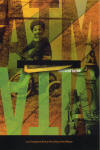ATM
There is something so predictable about the transactions we have with those quiet machines that feed us our money: the ‘automated teller machines.’ The poems in Christopher Salerno’s ATM often return to routine transactions with these devices and tug at where mundane moments can lead attention. With humor and melancholy, they collect details of ways the concrete and the ethereal mash together in modern life—how this exchange gives us a “sense of the world / as souvenir.”
There is something so predictable about the transactions we have with those quiet machines that feed us our money: the ‘automated teller machines.’ The poems in Christopher Salerno’s ATM often return to routine transactions with these devices and tug at where mundane moments can lead attention. With humor and melancholy, they collect details of ways the concrete and the ethereal mash together in modern life—how this exchange gives us a “sense of the world / as souvenir.”
The phrase ‘sense of the world’ seems a good starting point for where and how these poems move. Within the world of contemporary poetry, one of the common streams seems focused on the holes in language and how the sense of self we create from language is an unstable thing. The poems in ATM do have a type of stable self, as there is a narrator who speaks in a consistent tone throughout the works. This is a calm voice that often arranges words in couplets on the page, with language that feels carefully selected. Yet there is a kind of instability to this self’s experience of the world. The happenings and phenomenon of life are deeply unpredictable, and observations shift quickly to reflect this.
The first poem, one of a few called “$,” begins: “I hope you like black comedy. / The black market in the rain.” The narrator moves from observations of a bird chase to a mention of soldiers’ prosthetic devices on the radio to wondering if he had heard the wrong word, perhaps it was ‘prothesis,’ used by the ancient Greeks for preparing the dead. Then the narrator remembers that:
. . . Language only blows
a thought apart, says Aristotle.
If you can hear this thought
you are inside a minor elegy
after a war. The black market
is filling with treasures.
Thus, we are introduced to an observer who will follow thoughts to unexpected places. In the second poem, sarcasm creeps in as the narrator waits at the ATM “for the wonderful machine to cough // up my balance.” But the poem returns to two elements mentioned in the previous poem—birds and explosiveness—and ends with a nature scene beside the bank machine:
I notice a large robin
egg on the sidewalk-
near the building, some tulips open
too wide to go on living.
Sometimes the voice of the poems speaks in a way that compresses what sounds like an old aphorism into casual speech. The poem “8:19 AM | 8/16/12 | WTHDRWL” begins, “Probably the world was once deluxe. Every city worth / seeing at least once. . . . ” In “$$”: “People are getting free shipping, and all the bees are gone.” These are both moments where poems begin with an understated sadness at some current outcome of this commerce-stained world. The second couplet of the second poem titled “$” leads to tongue-in-cheek aphoristic announcements after its unique beginning:
Slept in headphones, dreamed of Henry
Thoreau with coke on his nose.
There is no way of firewalling dreams
from the excesses of dreams.
I went to the woods for business purposes.
To redefine the word “afford”.
Here is a deep unpredictability of reality: that first line stands in for how tangled the past and present are in the narrator’s consciousness. The amusing strangeness of placing a symbol of the life of deliberate simplicity right up against what was once the ‘toy’ drug of the NY wealthy back in the 80’s is an effective way to jar a reader to pay attention. The “excesses of dreams” Salerno describes may just be more pronounced versions of excesses in regular life and how that life is experienced. Later in the same poem, the narrator muses about the feeling of owing money, how for future humans, “Possibly all / we’ll have is the pale sensation // of a debt coming due.”
The poems of ATM occupy a world with an intense awareness of money as a habit or a pressure on the back of the mind. About half of the titles refer to bank card numbers, money symbols, or specific moments of making deposits or withdrawals. Yet, although the narrator attends to this material world, he tells us, “My money is // always hiding.” These are poems that look at how attention shifts and discover unexpected moments of gain and loss. I found lines often rose off the page, such as with the end of “Representative” when the narrator, trying to remember an ATM password, imagines “The name of your / favorite pet echoing through the house.” And these are poems that are as much about consciousness—how it moves, how it ‘transacts’ with the surrounding world and the world of memory—as they are about the suburban New Jersey landscape this poet is from.





